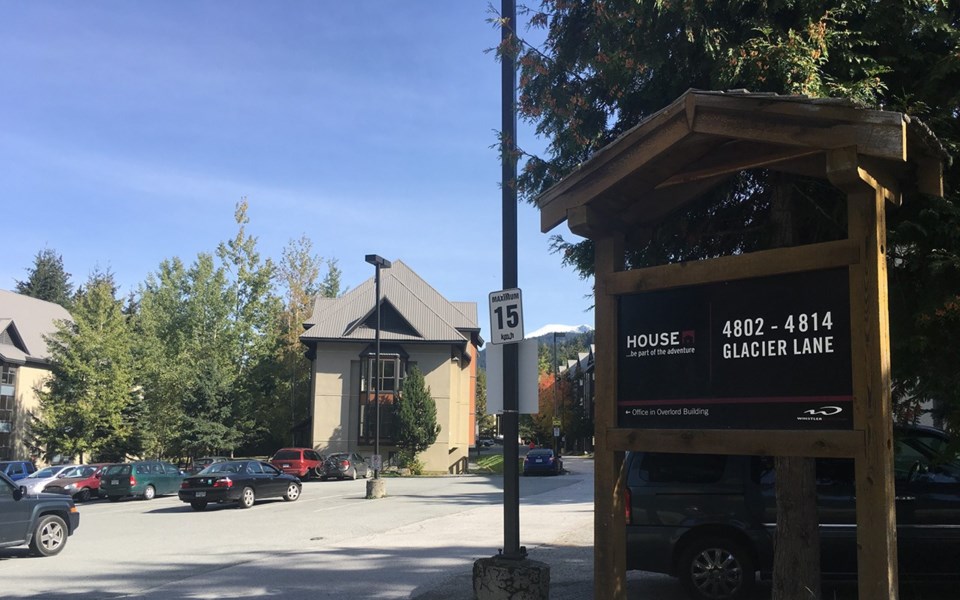For months, Whistler Blackcomb (WB) has been dropping hints about a housing announcement on the way. On Tuesday, Sept. 25, the community learned of those plans: a 200-bed staff-housing complex slated for Glacier Lane.
"It was always out there and something we knew we needed to work on, so to actually be able to confirm that it's happening feels incredible," said Pete Sonntag, COO of Whistler Blackcomb, in a sitdown with Pique and outgoing Mayor Nancy Wilhelm-Morden.
The "Glacier 8" facility, as it is currently called, will be located adjacent to the Whistler Blackcomb operations building and in the same complex as staff buildings on Glacier Lane. It will consist of dorm-style units that will be targeted at seasonal staff. No cost for the project is available at this early stage.
The complex is expected to open for the 2020-2021 ski season, Sonntag said.
Whistler Blackcomb confirmed the rent would fall below market rate, in line with the ski resort's existing staff housing options. The rent at Glacier Lane's current staff housing complex is calculated at $12.65 a night, for a minimum 14-day stay, WB said.
The company currently houses 31 per cent of its 4,000-plus workforce, either at the buildings it manages or in housing it rents in the wider community. With the addition of Glacier 8, WB will end up housing more than a third of its staff.
"Relative to the other resorts in the Vail Resorts' portfolio, we're actually in really good shape, and yet, that doesn't do anything for the people who are unable to find housing, and we're facing the same challenges that every other employer is in the community," Sonntag said.
Sonntag added that the addition of 200 staff beds won't resolve the company's—nor the community's—housing shortage, but he sees it as an important step forward.
"This doesn't solve everything, so we know we need to stay on the gas and continue to work with the RMOW (Resort Municipality of Whistler) to find solutions," he explained. "The dorm style is one solution, but there are a lot of other housing solutions out there that we need to look at as well for different employee groups."
Adding dormitory-style housing was one of the priorities of the Mayor's Task Force on Resident Housing, formed in 2016 to address the resort's affordable housing shortage.
Last fall, the RMOW announced plans to add 1,000 new beds to the community over the next five years. Some of those projects are already completed, such as the 27-unit Whistler Housing Authority (WHA) complex in Cheakamus Crossing, or are underway, such as a 20-unit housing project aimed at seniors in Rainbow, and another WHA project in Cheakamus, this one slated for 24 units.
As her term comes to an end, Wilhelm-Morden said she was happy with the progress the municipality has made on the housing file, highlighting the work of the municipal housing task force, including the crackdown on illegal nightly rentals and council's recent decision to send five housing proposals from private developers through the rezoning process.
"We've made terrific progress. It's going to take a little while for some of the steps to actually filter down and be felt on the ground—but this is a wonderful announcement," she said of WB's housing plans.
"We really are well on our way—not to resolving the issue, because we never will, to be realistic, but to making significant progress on it. So I feel really good."
On Monday, Oct. 1, the RMOW will be hosting an open house to update the community on the progress that's been made on the master-planning process for employee housing proposed for Cheakamus Crossing. Phase 2 plans are focused on how best to develop 550 employee-restricted homes on municipal lands in the neighbourhood for both permanent and seasonal residents.
The open house is scheduled for 4:30 to 6:30 p.m. in the Emerald Ballroom at the Westin Resort & Spa.




